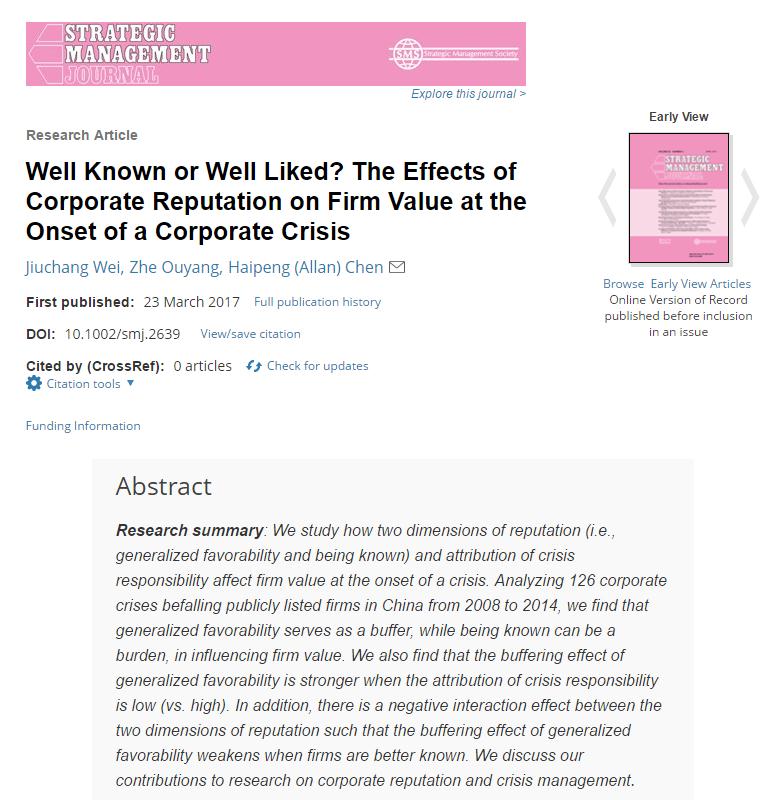
Recently, an article entitled “WELL KNOWN OR WELL LIKED? THE EFFECTS OF CORPORATE REPUTATION ON FIRM VALUE AT THE ONSET OF A CORPORATE CRISIS”, written by a team led by Professor Wei Jiuchang from the Risk & Strategy Management Research Center of the USTC School of Management (SOM) was published in the top journal “Strategic Management Journal”. This journal is known as one of the best in the strategic management area, is an international A+ type journal, is one of the journals in the UTD 24 tracking project and has accepted only 5 articles with first authors from universities and research institutions in mainland China. This is SOM’s first paper published in a top journal in the strategic management area, heralding a significant breakthrough in top-level research at the School of Management. PhD candidate Ouyang Zhe from SOM (USTC) and Professor Haipeng (Allan) Chen from Mays Business School (Texas A&M) are co-authors of this paper.
This article primarily studies the effects of corporate reputation on firm value at the onset of a corporate crisis, which is to say the important effect of social perception (corporate reputation) and contingency (attribution of responsibility) on the reaction of investors to a corporate crisis. The main contributions of this article are as follows. Firstly, this research analyzes the potential interaction effects between different dimensions of reputation, which had not been studied in previous research. Secondly, to some extent, this research eases the debate about the two-sided effect of corporate reputation. It is found that the public reputation of a corporation can be a buffer zone which will reduce the loss of shareholders after a crisis happens. However, corporate popularity among the investors also may be a burden that aggravates the loss of shareholders after a crisis happens, with the negative moderating effect of attribution of crisis responsibility on reputation. As a result, this paper reveals the tension between reputation protection and burden effect theory. Finally, while attribution of responsibility is regarded as the key construct that affects the reaction of stakeholders, previous research on this is still mainly conceptual. This paper empirically studies the effect of attribution of responsibility on firm value when any crisis happens, giving a comprehensive answer where most the previous research relied on surveys or experiments covering just a few types of crisis. This study enriches the research situation for corporate reputation theory, providing a strong theoretical base for practical decision-making in corporate reputation asset management and risk management.
This research took around 3 years to complete, with financial support from National Natural Science Foundation for Outstanding Young Scholars Project (71522013) and National Natural Science Foundation in Management Science Project(71642005).
It is well known that the number of papers published in top journals of the management area hold great weight in the evaluation of world-known business schools. The School of Management USTC takes “Stand tall (top-level theory) and set feet on the earth (strong practical ability)” as its principle of teaching and research, and has attached great importance to creating first-class achievements that feature international level, put emphasis on China’s conditions and national needs, and promote high-level scientific research. So far, SOM has published many articles in the top journals of the management area and its ability in academic research ranks highly among all the business schools in China.
The Risk & Strategy Management Research Center of SOM mainly focuses on the area of social risk analysis and crisis communication, doing research under the leadership of Prof. Wei Jiuchang, and scholars there have made some breakthroughs. They have proposed criteria and strategy choices for crisis information precision release, and quantified the release mode and discrimination method for crisis information in different crisis situations, with a quantitative presentation of different crisis types from the perspective of information flow. They also recognized the differentiation of decision-making of stakeholders in different crisis situations, and evaluated the effect of specific risk factors on economic society quantitatively. Meanwhile, scholars of the Center also show devotion to the national wisdom pool in ways other than publishing articles in the management area. At present, the center has co-applied for one of the first batch of “wisdom pool projects” funded by the National Natural Science Foundation in Management Science, partnering with the Center of Crisis Management Research Tsinghua University and the China National School of Administration. The proposed project is called “Research on China’s Society Security Risk Government in 13th Five-Year Plan (71642005)”, to be led by Prof. Xue Lan, Tsinghua University. This Center is primarily responsible for the research of public risk perception. In 2016, in response to the needs of the country, the National Natural Science Foundation decided to establish “wisdom pool projects” based on the Crisis Management Project of Management Science department, to take full advantage of its basic research. In contrast to the other research projects, the wisdom pool projects supported by the National Natural Science Foundation emphasize the accumulation of basic theory, exploration of policy research tool and application of formal, scientific research methods. Hence, a research team must be a stable team formed in the long-run research context, focusing on a certain area, having a solid academic basis, and skilled in data accumulation. The research theme must be difficult and concern problems that the country will continuously focus on in its big decisions. After several rounds of evaluation, only 6 of 90 applicant teams were selected to be funded , including the project from USTC. All 6 teams have a basis of excellent academic research and extensive policy research to serve the policy-making needs of the country.
(School of Management, USTC)







